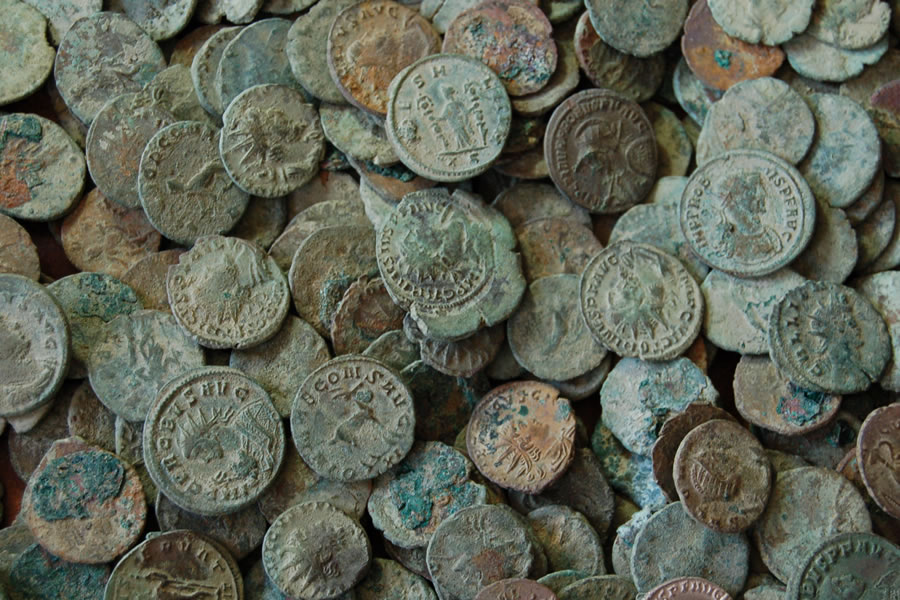St. Francis of Assisi Weekly Reflections
Oil of the Sick
10-29-2017Liturgy CornerFr. Paul Turner © 2002 Resource Publications, Inc.The oil of the sick is used for the sacrament in the Catholic Church. Traditionally this oil is olive oil, but any vegetable oil will suffice. The bishop blesses fresh oil each year; in case of necessity, any priest may bless the oil for this sacrament. In the distant past lay people anointed the sick, but today only a priest or bishop may administer this sacrament.
This sick were anointed even at the time of Christ. In Mark 6:13, Jesus sent the disciples out to anoint the sick. James 5:14 urges the sick to send for the elders of the church for an anointing. The custom of anointing the sick continued, but for several hundred years only the dying were anointed. The priest prayed for their forgiveness and anointed them on seven different parts of the body.
READ MORELove of Neighbor
10-29-2017Question of the Week- Reading I: Exodus 22:20-26 (social laws)
- Reading II: 1 Thessalonians 1:5-10 (a model for believers)
- Gospel: Matthew 22:34-40 (the greatest commandment)
- Key Passage: [Jesus] said to him " 'You shall love the Lord your God with all your heart, and with all your soul, and with all your mind.' This is the greatest and first commandment. And a second is like it: 'You shall love your neighbor as yourself.'" (Matthew 22:37–39)
- Adult: In a practical sense, what is one thing that would change in your life if you loved your neighbor as yourself?
- Child: Why is it hard sometimes to love your neighbor?

Love God - Love Neighbor
10-29-2017Weekly Reflection©2017 Liturgical Publications, Inc.As we live in a world in which people are fleeing their homeland and seeking refuge in unwelcoming countries, today’s readings from Exodus and the Gospel are particularly timely, serving as reminders of how God’s word calls us to love God and all God’s children, but especially the vulnerable, powerless, and poor. In biblical times, the prophets threatened God’s anger particularly at the neglect of widows and orphans who were reduced to lives of begging, starvation, and abuse. In modern times, it is refugees and immigrants, especially women and children, and the urban and rural poor who suffer violence, hunger, and death. Loving God and loving neighbor cannot be separated. Saint Paul reminds the Thessalonians that they became imitators of him and of the Lord after receiving the word of God, and thus they became models for all other believers in the vicinity. Then, they proclaimed it to others and embodied it in their lives. The word of God instructs us that we are all God’s children and calls us to care for each other.
We must remember how much we have been given and ask: How can we imitate God’s generosity? How can we make a return to the Lord?
READ MORE
How do you spend God’s wealth?
10-22-2017Weekly ReflectionWe Celebrate Worship Resource, Vol. 42, No. 2The prophet called Second Isaiah, writing during the time of Israel’s exile in Babylon, was not afraid to get involved in politics. A new power was rising in the middle East, the Persian Empire under the leadership of Cyrus, which would overthrow Babylon. The prophet sees this as a divine intervention, done for the sake of Israel. In contrast, Jesus is careful not to give his enemies any ammunition as they try to trap him into commenting on the political situation of his day. The Roman coin carried the image of the emperor, proclaiming Caesar divine. A devout Jew would not even have one on him. When the issue of paying taxes comes up, Jesus first asks for a coin. (While Jesus does not have one, the Pharisees do!) His retort, “Give to Caesar what belong to Caesar,” is simply a call to return Caesar’s image to him (cf. Matthew 22:21). But we are to give what carries God’s image—the human heart, mind, and soul—to God. Saint Paul’s words opening his first Letter to the Thessalonians suggests how we carry this out: by living lives of faith, love, and hope.
Do you see yourself as part of God’s true wealth, to be spent doing good for others?
READ MORESocial Responsibility
10-22-2017Question of the Week- Reading I: Isaiah 45:1, 4-6 (rewards to Cyrus, king of Persia)
- Reading II: 1 Thessalonians 1:1-5 (a model for believers)
- Gospel: Matthew 22:15-21 (paying tax to the emperor)
- Key Passage: At that [Jesus] said to them "Give therefore to the emperor the things that are the emperor's, and to God the things that are God's." (Matthew 22:21)
- Adult: How much responsibility do you feel the government should take for meeting the needs of the less fortunate in our society? How willing are you to contribute?
- Child: Who needs help in your neighborhood or community? What could you and your family do to help?
Catechumen
10-22-2017Liturgy CornerFr. Paul Turner © 2001 Resource Publications, Inc.A catechumen is an unbaptized person preparing for baptism, confirmation, and communion. A catechumen is an apprentice—someone who is learning about the faith from those more experienced at it while practicing the faith to the extent possible. The word looks plural, but it is singular. A "catechumenate" is a group of catechumens; it is also the word for their formation.
Catechumens range in age. Some are adults; others are as young as children preparing for first communion. If Catholic parents want their infant to be baptized, the child does not become a catechumen first. A person becomes a catechumen by participation in the rite of acceptance into the order of catechumens.
READ MORERite of Acceptance
10-15-2017Liturgy CornerFr. Paul Turner © 2001 Resource Publications, Inc.The rite of acceptance into the order of catechumens establishes a relationship between unbaptized persons and the church. Candidates express their intention to become members, and the church accepts them as catechumens. The ceremony may take place several times a year at a weekend Mass. Ideally, it begins outside the church. The priest for the Mass usually presides, but a deacon may do so.
The celebrant greets everyone and recalls the religious experience of the candidates. As they and their sponsors step forward. He asks the candidates their names and two questions about what they are seeking and why. The sponsors and assembly express their willingness to help the candidates find and follow Christ. The celebrant prays.
READ MORE
How often do you put on Christ?
10-15-2017Weekly ReflectionWe Celebrate Worship Resource, Vol. 42, No. 2The comforting words of Isaiah offer an image of the end of time, when all nations will come to God’s holy mountain for a great feast of rich food and choice wines. This occasion will mark the celebration of God’s final conquest of death, when every tear will be wiped away and we will know God as our savior. How fitting that this reading is often used at funerals. Jesus also turns to the image of a feast, now a wedding feast, but his parable presents more challenge than comfort. Those invited have refused, even treating abusively those sent to gather the guests. The early church heard in this the story of Jesus’ own rejection and death at the hand of Israel’s leaders. What is here for us? First, we are reminded that we too have been invited to celebrate God’s “marriage” with humankind in the person of Jesus Christ, truly God and truly human. The puzzling incident of the man who shows up without a wedding garment signals that our lives are a preparation for this final celebration, and that we are to arrive there having put on Christ in Baptism and grown into that garment.
How does the garment of Christ fit today?
READ MORELiving Our Faith
10-15-2017Question of the Week- Reading I: Isaiah 25:6-10 (a feast for all peoples)
- Reading II: Philippians 4:12-14, 19-20 (generosity)
- Gospel: Matthew 22:1-14 (the wedding banquet)
- Key Passage: Jesus said, "Many are invited, but few are chosen." (Matthew 22:14)
- Adult: How do you translate your faith into the work of the Reign of God?
- Child: What three things can you do this week to show that you are a follower of Jesus?
RCIA
10-08-2017Liturgy CornerFr. Paul Turner © 2001 Resource Publications, Inc.If you are interested in joining the Catholic Church, you'll hear about something called "RCIA." The initials stand for Rite of Christian Initiation of Adults, the book ministers use to guide you through the stages and steps of church membership.
If you've never been baptized, and you are old enough to read this, you begin your preparation with the precatechumenate. During this time you have some spiritual conversation about God and the Church.
Once you decide to follow Jesus Christ, you celebrate the rite of acceptance into the order of catechumens. As a catechumen, you are considered a member of the Church in a broad sense. Unmarried catechumens may have a Catholic wedding; deceased catechumens may have a Catholic funeral.
READ MOREDealing with Injustice
10-08-2017Question of the Week- Reading I:Isaiah 5:1-7 (the vineyard song)
- Reading II: Philippians 4:6-9 (joy and peace in Christ)
- Gospel: Matthew 21:33-43 (parable of the tenants)
- Key Passage: Jesus said, "Therefore I say to you, the kingdom of God will be taken away from you and given to a people that will produce its fruit." (Matthew 21:43)
- Adult: How have you used your talents and abilities well for the Reign of God?
- Child: What can you do in your week to help the love of God grow in the world?

How do you answer this call to produce fruit?
10-08-2017Weekly ReflectionWe Celebrate Worship Resource, Vol. 42, No. 2The poet-prophet Isaiah uses the imagery of a vineyard and its owner to tell the sad story of the relationship between God and Israel, whom God has called into a covenant relationship. God's loving care for Israel is imaged in all the owner does to ensure that the vineyard bears fruit, but then only result is a crop of wild grapes. Isaiah hands down a verdict of divine judgment of Israel. Jesus also used the image of the vineyard, but is becomes a parable of judgment on the chief priests and elders who have refused to honor the prophets God has sent, including God's own Son, Jesus. Such failure in leadership will lead to God entrusting the vineyard (God's people) to more trustworthy caretakers. We too can hear in these readings a call to take to heart God's desire that the people bear fruit, thereby giving God glory. Such fruit Saint Paul identifies as bringing God's justice, peace, beauty, and grace into the world, especially through faithful service on the part of all in positions of leadership in the church society.
How do you answer this call to produce fruit?
READ MOREThe Challenge to Forgive
10-01-2017Question of the Week- Reading I:Ezekiel 18:25-28 (personal responsibility)
- Reading II:Philippians 2:1-11 (imitating the humility of Christ)
- Gospel: Matthew 21:28-32 (parable of the two sons)
- Key Passage: A man had two sons; he went to the first and said, "Son, go and work in the vineyard today." He answered, "I will not"; but later he changed his mind and went. The father went to the second and said the same; and he answered, "I go, sir"; but he did not go. Which of the two did the will of his father? They said, "The first." (Matthew 21:28–31)
- Adult: When have your actions not measured up to your promises? What was the outcome?
- Child: Why is it important to follow through on your promises to others?

What is your answer to God’s Will? Yes or No
10-01-2017Weekly Reflection©2017 Liturgical Publications, Inc.Notice that Jesus is addressing the religious leaders in today’s Gospel, those who made a display of their dedication to keeping God’s law. In response, Jesus presents a simple parable in which a father asks his two sons to work in his field. A spoken “No” from one becomes an enacted “Yes.” With the other, the opposite happens: “Yes” in word becomes “No” in deed. Jesus then asks, Which son did his father’s will? The answer condemns the leaders, because they have been rejecting Jesus’ outreach to sinners and thus hindering him from doing his Father’s will. Doing God’s will is what matters. Ezekiel is making the same point when he says that turning from wickedness brings life to a sinner. This conversion is doing God’s will. Saint Paul uses an early Christian hymn to call the Philippians to have the same mind that was in Christ, the obedient Son of God. Through his self-emptying, Jesus humbly served the Father’s will, becoming obedient even until death on a cross. As Saint Paul says elsewhere, Jesus was not “Yes and No” but in him it is always “Yes” (cf. Corinthians 1:19).
What is God asking of you? Are you always “Yes”?
READ MOREChrism
10-01-2017Liturgy CornerFr. Paul Turner © 2001 Resource Publications, Inc.Chrism is the most special of all the oils used for Catholic sacraments and rituals. Traditionally, it is olive oil enhanced with balsam, a perfume. Today, other oils and perfumes may be used, especially in regions where the traditional ingredients are difficult to obtain. No matter the formula, chrism should have a pleasing aroma.
Chrism is the oil used for the three sacraments that may be received only once in a lifetime: baptism, confirmation, and ordination to the priesthood. It carries a strong association with the Holy Spirit, who consecrates the faithful for service according to the sacrament they receive.
READ MORE